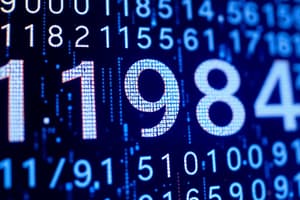Podcast
Questions and Answers
Aşağıdaki ifadelerden hangisi doğrudur?
Aşağıdaki ifadelerden hangisi doğrudur?
- Asal sayılar herhangi bir sayı ile bölünebilir.
- Asal sayılar hanya 2 ile bölünebilir.
- 2 dışında tüm asal sayılar tek sayılıdır.
- Asal sayılar hanya 1 ve kendileri dışında bölünebilir. (correct)
Şifreleme algoritmalarında asal sayıların kullanımına hangi özellik dayanır?
Şifreleme algoritmalarında asal sayıların kullanımına hangi özellik dayanır?
- Asal sayıların çokluğu özelliğine
- Asal sayıların faktöriyel özelliğine (correct)
- Asal sayıların karmaşıklığına
- Asal sayıların bölünebilme özelliğine
RSA algoritması hangi sayıları kullanır?
RSA algoritması hangi sayıları kullanır?
- İki büyük asal sayı (correct)
- Herhangi iki sayı
- Tek sayılı sayılar
- Çift sayılı sayılar
Asal sayılar hangi özellik nedeniyle şifrelemede kullanılmaktadır?
Asal sayılar hangi özellik nedeniyle şifrelemede kullanılmaktadır?
N = pq formülünde N nedir?
N = pq formülünde N nedir?
Aşağıdaki ifadelerden hangisi asal sayı değildir?
Aşağıdaki ifadelerden hangisi asal sayı değildir?
Kriptografide asal sayıların kullanımının en önemli sonucu nedir?
Kriptografide asal sayıların kullanımının en önemli sonucu nedir?
Birleşik sayıların faktörlenmesi ne demektir?
Birleşik sayıların faktörlenmesi ne demektir?
Kriptografide neden asal sayılar kullanılır?
Kriptografide neden asal sayılar kullanılır?
RSA şifreleme algoritmasında ne kullanılır?
RSA şifreleme algoritmasında ne kullanılır?
Asal sayıların kriptografideki kullanımı hangi sonucu doğurur?
Asal sayıların kriptografideki kullanımı hangi sonucu doğurur?
Kriptografide asal sayıların kullanım amacı nedir?
Kriptografide asal sayıların kullanım amacı nedir?
Flashcards are hidden until you start studying
Study Notes
Mathematics in Cybersecurity: Prime Numbers
Prime numbers play a vital role in the field of cryptography, which is a crucial aspect of cybersecurity. They are used to create secure communication channels by providing the foundation for encryption algorithms, such as the widely-used RSA (Rivest-Shamir-Adleman) algorithm. In this article, we will delve into the applications of prime numbers in cryptography and how their properties make them essential for secure data transmission.
What are Prime Numbers?
Prime numbers are integers greater than 1 that have only two distinct positive divisors: 1 and the number itself. For example, 2, 3, 5, and 7 are prime numbers, as they can only be divided by 1 and themselves. The first few prime numbers are: 2, 3, 5, 7, 11, 13, 17, 19, 23, and so on.
Prime Numbers in Cryptography
The use of prime numbers in cryptography is based on their property of being difficult to factorize. This property is exploited in the RSA algorithm, which is a widely-used encryption algorithm. The algorithm works by choosing two large prime numbers, p and q, and multiplying them together to obtain a public key, N = pq. The public key is then used to encrypt messages, while the private key, d, is used to decrypt them. The difficulty of factoring large prime numbers into their original factors makes it computationally infeasible for an attacker to obtain the private key, ensuring the security of the encrypted communication.
Prime Factorization and RSA Encryption
In the context of RSA encryption, prime numbers are used to determine the factors of a large composite number, which is then used as the public key. This process is known as prime factorization. Factoring a number means identifying the prime numbers which, when multiplied together, produce that number. However, finding the prime factors of a large composite number is difficult, as it would require attempting all possible combinations of factors. This difficulty is exploited to create a secure encryption algorithm.
The Importance of Prime Numbers in Cryptography
The use of prime numbers in cryptography ensures the security of encrypted communication channels. By choosing large prime numbers as factors for the public key, it becomes computationally infeasible for an attacker to determine the private key and decrypt the messages. This property is essential for securing sensitive information during data transmission over networks.
Summary
Prime numbers are a fundamental concept in mathematics that play a crucial role in the field of cryptography. Their unique properties, such as being difficult to factorize, make them essential for creating secure encryption algorithms. The use of prime numbers in cryptography has revolutionized data security, enabling the transmission of sensitive information over networks with confidence.
Studying That Suits You
Use AI to generate personalized quizzes and flashcards to suit your learning preferences.




